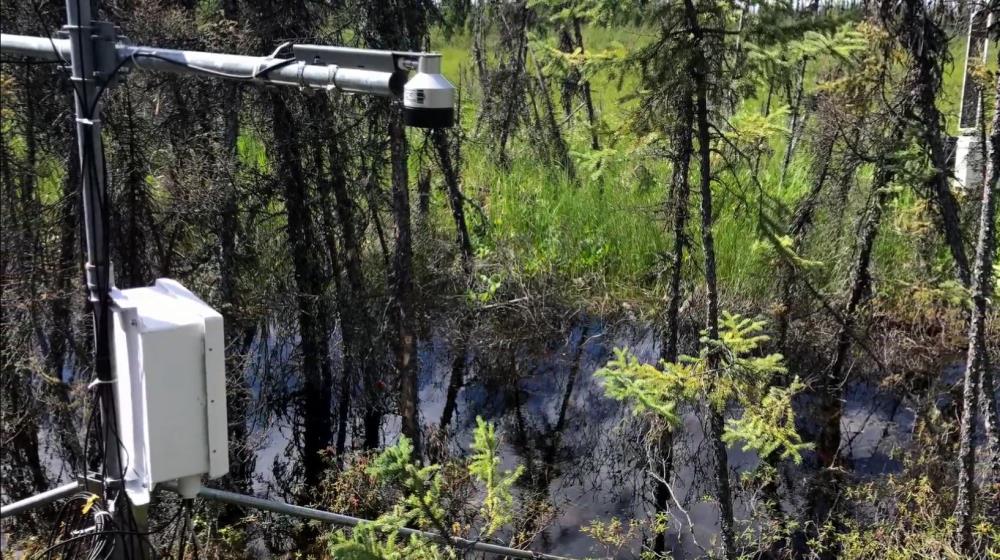
Related items loading ...
Section 1: Publication
Publication Type
Conference Presentation
Authorship
He Zhihua, Shook Kevin, Spence Christopher, Pomeroy John W., Whitfield Colin
Title
Modelling the effects of climate change on snowmelt, soil moisture and streamflow generation for the Canadian Prairies
Year
2022
Publication Outlet
AOSM2022
DOI
ISBN
ISSN
Citation
Zhihua He, Kevin Shook, Christopher Spence, John W. Pomeroy, Colin Whitfield (2022). Modelling the effects of climate change on snowmelt, soil moisture and streamflow generation for the Canadian Prairies. Proceedings of the GWF Annual Open Science Meeting, May 16-18, 2022.
Abstract
The effects of climate change on Canadian Prairie small basin snowpacks, snowmelt, soil moisture and streamflow were investigated using a virtual basin modelling approach. Seven representative basin models created using the Cold Regions Hydrological Modelling platform (CRHM) were forced by reference meteorological observations from 1960-2006 to simulate characteristic streamflow, soil moisture and snow accumulation regimes in Alberta, Saskatchewan and Manitoba. To evaluate sensitivity to climate, four precipitation (P) perturbation scenarios, with P ranging from 80% to 130% of reference, and six air temperature (T) perturbation scenarios with mean T warming from 1°C to 6°C, were used to force the models. The simulations showed that snow accumulation and its duration showed similar and linear sensitivities to climate perturbations in the seven Prairie basin types, whilst snowmelt-driven surface runoff and infiltration in the pothole-dominated basins showed highly non-linear sensitivities to T warming, because of the impact of partially frozen soils on runoff generation during spring melt. Melt-driven surface runoff increased by 4% with a 2 °C warming in the Prairie Pothole basins, differing from the expected decreases in grassland-dominated, river valley and southern Manitoba basins. Moreover, the seasonal snowmelt infiltration in the pothole-dominated basins changed very little as the T increased from +2 °C to +6 °C, contrasting with the progressive decreases in the grassland-dominated basins. A 30% increase in P could only compensate for snowmelt decreases (around 18%) caused by 3–4 °C warming, in all the seven basin types. Soil moisture showed a nearly linear sensitivity to P changes, whilst showing decreased sensitivity to warming with higher T. The maximum reduction of 20% in soil moisture caused by 6 °C warming could be compensated by increases of 18% in P. Elasticity (percent change in soil moisture divided by change in a climate forcing) indicated that soil moisture in southern Manitoba basins was less sensitive to climate perturbation than in other basin types. Annual streamflow declined by 29-77% in response to a 6 °C warming with the largest reduction in the grassland-dominated basins, but these decreases could be largely compensated for by P increases of up to 30%. The impacts of climate change on streamflow tended to be larger in basins with less depressional storage, suggesting wetland prevalence reduces the sensitivity of Canadian Prairie hydrology to the impacts of climate change.
Plain Language Summary
Section 2: Additional Information
Program Affiliations
Project Affiliations
Submitters
|
Zhihua He | Submitter/Presenter | zhh624@mail.usask.ca | University of Saskatchewan |
Publication Stage
N/A
Theme
Hydrology and Terrestrial Ecosystems
Presentation Format
10-minute oral presentation
Additional Information
AOSM2022 Prairie Water First Author: Zhihua He, Centre for Hydrology, University of Saskatchewan, Saskatoon, Saskatchewan, Canada Additional Authors: Kevin Shook, Centre for Hydrology, University of Saskatchewan, Saskatoon, Saskatchewan, Canada; Christopher Spence, Environment and Climate Change Canada, Saskatoon, Saskatchewan, Canada; John W. Pomeroy, Centre for Hydrology, University of Saskatchewan, Saskatoon, Saskatchewan, Canada; Colin Whitfield, School of Environment and Sustainability, University of Saskatchewan, Saskatoon, Saskatchewan, Canada


 GWFNet
GWFNet Master
Master Data
Data Research
Research Map
Map
 Advanced
Advanced Tools
Tools
 . . .
. . .
 Metadata Editor
Metadata Editor
 Record List
Record List
 Alias List Editor
Alias List Editor
 Legacy sites
Legacy sites